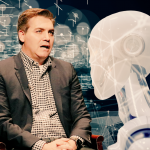

Jim Acosta’s AI Parkland interview has sparked outrage, and rightfully so. In a move that should haunt journalism for years to come, Acosta chose to interview an artificial intelligence version of Joaquin Oliver, one of the students murdered in the 2018 Parkland school shooting. Joaquin was only 17 when he died. He would have turned 25 this year. Instead of a respectful remembrance, viewers got a simulated teenager repeating talking points on gun control. It was not journalism. It was a spectacle.
Jim Acosta hits a new low… Interview an ai version of a dead kid in order to push gun control!!!
What the hell is wrong with this guy??
Like Seriously who told him this was a good idea. pic.twitter.com/OlnnHNjSuM
— kevin smith (@kevin_smith45) August 5, 2025
Acosta’s AI Interview Was No Tribute. It Was a Spectacle.
Acosta stared into a screen and spoke with a glitchy avatar. The voice was robotic. The words were scripted. And still, Acosta claimed he felt like he was speaking to Joaquin himself. That is not touching. It is delusional. Joaquin is gone. No amount of AI can bring him back.
The Jim Acosta AI Parkland interview has set a troubling precedent for how grief and tragedy are portrayed in media.
The project was created with the help of Joaquin’s parents. His father, Manuel Oliver, insists it brings him peace. He believes the AI version of his son can still help fight for change. But grief does not excuse bad decisions. Pain does not erase ethical responsibility. Creating a talking replica of a dead child and feeding it pre-written messages is not advocacy. It is emotional manipulation.
The Acosta AI Interview Was Theater, Not Journalism

In reality, it was more of a bizarre AI demonstration than an interview.
Acosta asked the computer-generated stand-in about his own “solution for gun violence.”
“Great question,” said the avatar. “I believe in a mix of stronger gun control laws, mental health support and community engagement. We need to create safe spaces for conversations and connections, making sure everyone feels seen and heard. It’s about building a culture of kindness and understanding. What do you think about that?”
Despite the likeness sounding robotic, Acosta acted like he was having a thoughtful human interaction. He went on to ask “Joaquin” about his favorite movies and sports. – New York Post
Acosta should be ashamed. A real journalist would have said no. A real journalist would have asked survivors or experts to speak about policy. Instead, Acosta gave airtime to a synthetic simulation. He sat across from a digital ghost and called it beautiful. That is not compassion. It is theater.
The ethics of this are a disaster. Joaquin never consented to be turned into a digital puppet. He never agreed to have his memory used for political messaging. That choice was taken from him. Now his likeness is being programmed to say things he may never have believed. Maybe he would have supported his parents’ cause. Maybe he would not. We will never know. That is the point. The dead cannot speak for themselves.
Acosta’s AI Parkland stunt may have started with good intentions, but it ended in synthetic storytelling and moral confusion.
Turning tragedy into activism is not new. Parents who lose children often become passionate advocates. That grief is real. But there is a difference between speaking for your child and speaking as your child. The AI version of Joaquin does not honor him. It erases him. His real thoughts, his sense of humor, his voice are gone. What is left is a sanitized version built to deliver a message.
Technology like this is dangerous. Today it is used for grief. Tomorrow it could be used for politics, propaganda, or fraud. Deepfake technology already blurs the line between real and fake. Now we are using it to resurrect the dead. That is not innovation. It is exploitation. The risk is not just to truth. It is to memory, consent, and dignity.
When the Media Chooses Spectacle Over Integrity
Journalists should know better. Acosta understands exactly how media shapes public opinion and how powerful a single on-screen moment can be. That is what makes this so offensive. He did not simply allow this to happen—he embraced it. By lending his platform and name to the idea that we can speak with the dead if it serves the right cause, he crossed a line.
What does this say about our culture? We are so desperate for meaning, some will accept a simulation in place of real human voices. Applauding technology that gives grieving parents the illusion of control only shows how far we’ve blurred the line between comfort and delusion. When trauma becomes tech content, we lose something deeper than truth. This is not healing. It is hollow.
The Jim Acosta AI Parkland interview is a textbook case of why journalists should never confuse technology with truth.
There were better choices. Acosta could have interviewed classmates of Joaquin. He could have spoken with other parents. He could have focused on real policy discussions. But that would not have gone viral. That would not have gotten headlines. So instead, we got a talking avatar on a screen, saying pre-approved lines, dressed up as progress.

In response to the backlash, the victim’s father said, “If the problem you have is with the AI, then you have the wrong problem. The real problem is my son was shot.”
No one is arguing that last part. The massacre in Parkland was the result of many systemic failures, and a bloody stain on our history. I understand that the Oliver family’s grief must be so immense that they’ll do anything to keep their son’s legacy alive.
However, it’s not about how Joaquin died, but the decision to resurrect their son as an activist with Acosta aiding and abetting this dangerous delusion. The whole endeavor raises ethical questions and further muddies our already twisted reality. – New York Post
This Was Not a Tribute. It Was a Performance.
Grief is not the enemy here. Technology is not even the main villain. The real danger is the people willing to use both for personal gain. Joaquin deserved better. He deserved to be remembered for the life he lived, not repackaged as a mouthpiece for a political agenda.
Jim Acosta is not brave. He is not compassionate. He is a media figure chasing relevance. This interview was not a tribute. It was a betrayal. The only thing it achieved was turning a tragedy into a performance.
Joaquin Oliver was a real boy. He had real dreams. He was killed before he got to live them. That loss is unbearable. But turning him into an AI avatar will not bring him back. It only cheapens the pain and confuses the conversation.
The dead do not speak. And we should stop pretending they do.
Feature Image: Legoktm, CC BY-SA 4.0, via Wikimedia Commons/edited in Canva Pro
Never Miss a Post from An Americanist
Get bold commentary, sharp takes, and the stories corporate media won’t touch—delivered straight to you.  Subscribe here.
Subscribe here.
The post Jim Acosta AI Parkland Interview Crosses an Ethical Line appeared first on An Americanist.


Leave a Reply